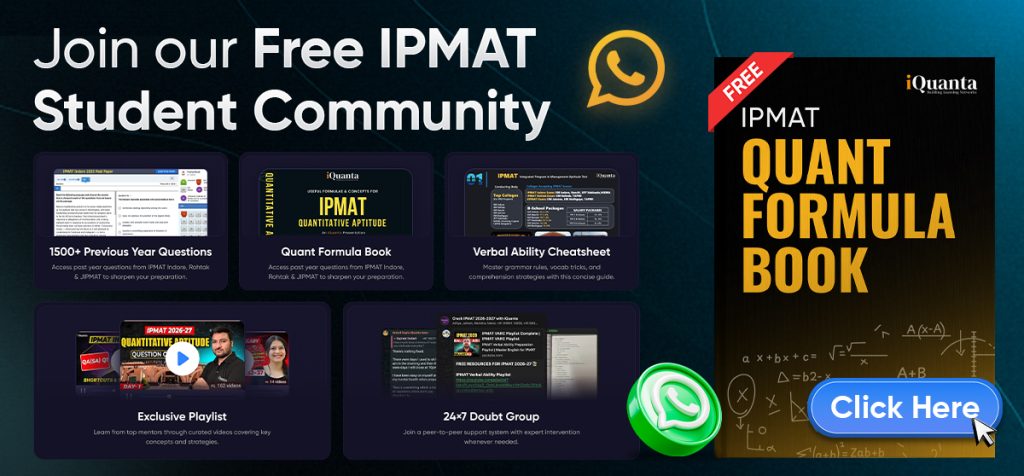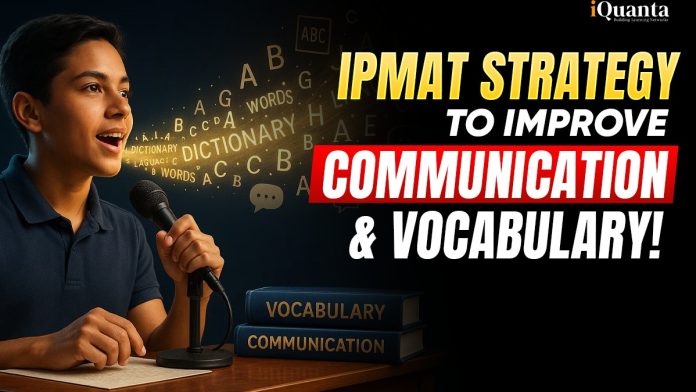Planning to appear for the IPMAT 2026? Are you in a constant hunt for a structured IPMAT Strategy to improve communication and vocabulary? Do you face difficulty while remembering unique and important words from the IPMAT syllabus? If the answer to all these questions is “Yes”, then this article is the best guide for you. Clearly, the VARC is the easiest yet the most challenging section in the IPMAT 2026. The IPMAT Indore 2026 question paper will consist of 45 questions from the Verbal Ability and Reading Comprehension section. The total number of questions in the VARC section of the IPMAT Rohtak 2026 and JIPMAT 2026 will be a bit different.
If you are appearing for the IPMAT Rohtak in 2026, you will see 40 questions in the actual exam. The JIPMAT paper will have 34 questions from the Verbal Ability section. Though the number of questions fluctuates for every IPMAT exam, the marking pattern remains the same. If you select the correct option, you will get +4 marks, and -1 will be the negative marking scheme for an incorrect response. Now that you know about the exam pattern for the VARC section of the IPMAT 2026, we will move forward to share the top-notch tips to strengthen your communication and vocabulary strategy to ace the VARC section of the IPMAT 2026.
Join this free IPMAT preparation group to get free study material, strategies by toppers and experts, latest updates and more

100% Valuable IPMAT Strategy To Improve Communication and Vocabulary
IPMAT (Integrated Post Graduate Management Aptitude Test) has become the most common preference to pursue a management degree after completing the 10+2 examination. Three major sections of the IPMAT 2026 are Quantitative Ability, Verbal Ability and Reading Comprehension and Logical Reasoning. The classifications of questions will be different in the IPMAT Indore 2026, IPMAT Rohtak 2026 and JIPMAT 2026. If we talk about the paper difficulty level, then it varies for every section every year. Candidates state that the Quantitative Aptitude is the toughest section.
However, it’s seen that students mainly face complexities while solving the problems from the VARC section, too. Do you wonder why it happens? In most cases, students don’t pay attention to studying the topics from the VARC section. They assume it’s General English and neglect it. As a result, they face challenges while solving questions from the VARC subtopics like sentence correction, reading comprehension, para jumbles, synonyms and antonyms, odd one out, word usage, etc. Hereby, we have come up with these 10 useful tips that you can follow blindly to develop a strong command of your communication and vocabulary in the IPMAT 2026.
IPMAT Strategy To Improve Communication Skills
- Active participation in Group Discussions: Study along with your peers to boost your communication skills. Take part in group studies and share your ideas with your fellow competitors.
- Practice Reading Comprehension: Create a personalised schedule to practice reading comprehension with focus and concentration. Summarise them in your own language to boost memory retention, interpret tough words and their meanings.
- Engage in Active Listening: An IPMAT aspirant can improve their reading comprehension skills only when they focus on three major factors,i.e, main context, structure and tone of the passage while reading or listening to it.
- Speak! Speak! Speak!: Start speaking with your friends and family using the same words and phrases to articulate your thoughts clearly. The more you speak, you will become a master in effective communication.
- Master the Art of Rephrasing Sentences: Start rephrasing articles in your own language to upgrade your critical-thinking and problem-solving skills. It will be a simpler and strategic approach to comprehend the RC passages.
IPMAT Strategy To Enhance Your Vocabulary
- Use Mnemonics: Basically, memory aids are the most important, successful and beneficial technique to level up your vocabulary for the IPMAT 2026. Make a habit of learning root words daily along with their prefixes and suffixes. This will take you through the journey of word formation along with their core meanings.
- Learn New Words Every Day: Enforce new words in your daily classroom conversations and discussions with friends and family members. It will be a part of the IPMAT strategy to improve communication and vocabulary to fortify memory retention.
- Read Editorials Daily: Editorials are the secret sauce for upgrading your vocabulary and pronunciation skills. Search for different types of editorials from The Hindu, The Economist, to interpret the complex business, social, historical and contemporary issues taking place all over the globe.
- Create a Word List Notebook: Compile unique words, meaning and example sentences in a single notebook from the day you implement this IPMAT strategy to improve communication and vocabulary. Go through this list every alternate day.
- Understand the word’s meaning through the dictionary: Open a dictionary and check the meaning of a new word whenever you face difficulty while understanding it. Keep a handy dictionary for quick revision. Do check for the meaning in the dictionary whenever you come across a new word and relate it to a proper example.
IPMAT VARC Syllabus 2026
You can make the best use of this IPMAT Strategy to improve communication and vocabulary only when you exhibit a proper understanding of the VARC syllabus. The syllabus of the IPMAT exam 2026 verbal ability will be a bit different for all three exams. There will be only a few similarities in the VARC syllabus of the IPMAT Indore, IPMAT Rohtak and JIPMAT. A detailed description of the IPMAT syllabus for the Verbal Ability and Reading Comprehension is below.
IPMAT Indore 2026: Updated VARC Syllabus
| IPMAT Entrance Exam | IPMAT Indore 2026 |
| Type of VARC Questions | Multiple Type Questions |
| Total Number of VARC Questions | 45 |
| Total Exam Duration | 120 Minutes |
| Sectional Time Limit | 40 Minutes For Every Section |
| Total Marks | 45 questions*4 marks=180 marks |
| IPMAT Indore Positive Marking Scheme | +4 per correct response |
| Negative Marking Pattern | -1 per incorrect response |
| IPMAT Indore VARC Syllabus 2026 | Grammar Reading and Comprehension Verbal Ability Vocabulary |
| Grammar | Noun & Pronoun Adverb & Verb Prepositions Conjunctions Direct & Indirect Speech Figures of Speech Articles Active – Passive Voice Poetic Devices Subject-Verb Agreement Sentence Correction |
| Reading and Comprehension | The meaning of a particular word used in the passage Tone of the author Tone of the passage Main Idea of the passage Reasoning based upon Passage Idioms/Phrases from passage Other questions based on thePassage |
| Verbal Ability | Error Spotting Fill in the blanks Sentence Completion Para jumbles Sentence Improvement |
| Vocabulary | Synonym & Antonyms Spelling Errors One Word Substitution Odd one out Incorrect Word Usage Phrasal Verbs Para completion Idioms & Phrases |
IPMAT Rohtak 2026: VARC Syllabus Overview
| IPMAT Entrance Exam | IPMAT Rohtak 2026 |
| Type of VARC Questions | Multiple Type Questions |
| Total Number of VARC Questions | 40 |
| Total Duration of the Exam | 120 Minutes |
| Sectional Time Limit | – |
| Total Marks | 40 questions*4 marks=160 marks |
| IPMAT Rohtak Positive Marking Scheme | +4 per correct response |
| Negative Marking Pattern | -1 per incorrect response |
| IPMAT Rohtak VARC Syllabus 2026 | Grammar Reading and Comprehension Verbal Ability Vocabulary |
| Grammar | Noun & Pronoun Adverb & Verb Prepositions Conjunctions Direct & Indirect Speech Figures of Speech Idioms & Phrases Etymology & Roots Articles Active – Passive Voice Subject-Verb Agreement |
| Reading and Comprehension | The meaning of a particular word used in the passage Tone of the author Tone of the passage Main Idea of the passage Inference-based questions |
| Verbal Ability | Error Spotting Fill in the blanks Sentence Completion Para jumbles Sentence Improvement Sentence Correction |
| Vocabulary | Synonym & Antonyms Spelling Errors One Word Substitution Odd one out Word Usage Analogy |
JIPMAT 2026: VARC Syllabus Top Highlights
| JIPMAT Entrance Exam | JIPMAT Indore 2026 |
| Type of VARC Questions | Multiple Type Questions |
| Total Number of VARC Questions | 34 |
| JIPMAT Exam Time Limit | 150 Minutes |
| Sectional Time Limit | – |
| Total Marks | 34 questions*4 marks = 136 marks |
| JIPMAT Positive Marking Scheme | +4 per correct response |
| Negative Marking Pattern | -1 per incorrect response |
| JIPMAT VARC Syllabus 2026 | Grammar Reading and Comprehension Verbal Ability Vocabulary |
| Grammar | Adverb & Verb Noun & Pronoun Active – Passive Voice Direct & Indirect Speech Idioms & Phrases Etymology & Roots Subject-Verb Agreement Figures of Speech Prepositions Articles Conjunctions |
| Reading and Comprehension | Particular word meaning from the passage Author’s Tone Passage Tone Original Passage Main Idea |
| Verbal Ability | Spot the error Complete the sentences Fill in the blanks Para jumbles Correct the sentences Sentence Improvement |
| Vocabulary | Synonym &Antonyms Analogies Spelling Errors Odd one out One Word Substitution Word Usage |
Final Words
Upcoming IPMAT aspirants, you must have a clear understanding now of what your IPMAT strategy should be to improve communication and vocabulary in 2026. You must have understood that the VARC section is not about rote memorisation but all about intelligence, presence of mind and a proper strategic approach. You don’t have to learn the entire dictionary of 5000-6000 words, but you have to solely focus on the most common and unique 500-800 words that appear in every IPMAT exam.
Throughout your preparation, you must be consistent with revision and practice. On the other hand, you must also incorporate these words in your day-to-day conversations and reading comprehension exercises. Last but not least, keep your learning spirit high by taking part in daily quizzes, building sentences and word game exercises. If you adhere to all these techniques very closely, then your IPMAT strategy to improve communication and vocabulary will speed up like rocket science.
If you are looking for a structured preparation for IPMAT along with 24×7 doubt solving, then you can go for iQuanta’s IPMAT Course

Frequently Asked Questions
What is the right IPMAT strategy to improve communication and vocabulary?
Your first step should be to develop a regular habit of reading a diversified range of newspapers, like The Hindu, The Economist, etc. Choose books and novels with a high level of English to facilitate your reading habits. Learn new words with the help of flashcards and start engaging in group discussions to utilise this IPMAT strategy to improve communication and vocabulary at a reflux speed with a clear objective to ace the IPMAT in 2026.
How soon can I cover the IPMAT VARC syllabus 2026?
An IPMAT aspirant must dedicate a minimum of 8-12 months to prepare for the VARC syllabus of the IPMAT 2026. This must include an in-depth proficiency in the VARC topics, vigorous revision, daily assignments practice, mock tests and performance analysis.
Is the VARC Syllabus the same for the IPMAT Indore, IPMAT Rohtak and JIPMAT?
No, you will find dissimilarities in the VARC syllabus of the IPMAT 2026. If you look closely, the RC passages of the IPMAT Indore are a bit complicated. Whereas the reading comprehension passages in the IPMAT Rohtak and JIPMAT are a bit simple and easy to solve.
What type of questions will appear in the VARC section of IPMAT 2026?
The VARC section consists of multiple-choice questions. It’s similar for all three IPMAT examinations in 2026. Candidates will receive +4 marks for every correct response. If you choose the wrong answer, you will get a -1 negative mark. So, ensure to attempt maximum questions with accuracy and speed for positive scores.
Will there be any negative marking for the Verbal Ability and Reading Comprehension section?
Yes, except for the Quantitative Ability (Short Answer) section in the IPMAT Indore 2026. There will be a -1 negative mark for every wrong answer for the MCQs from the QA, VARC and LR sections. Practice a mix of questions from every section, solve PYQs, and appear for mocks to attempt different types of questions from the VARC and other sections at your fingertips.




